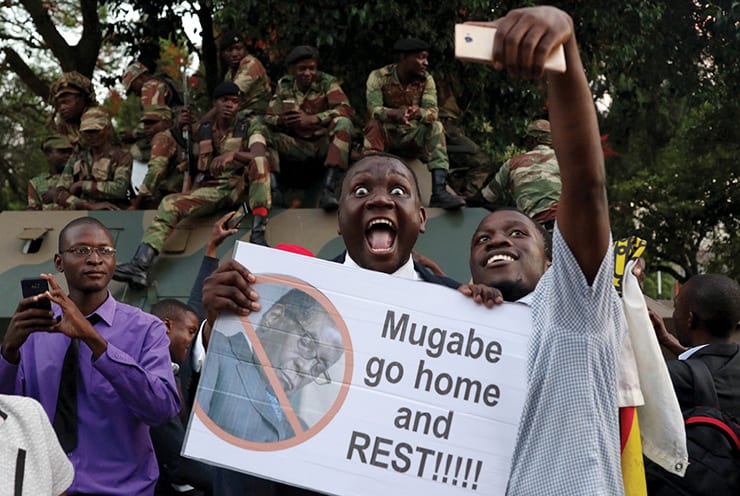According to data collected by University of Kentucky political scientists Jonathan Powell and Clayton Thyne, there were about 450 coups worldwide between 1950 and 2010.
Most, like Zimbabwe’s, effected little change in a country’s underlying problems of poor governance, corruption, weak rule of law, and bad economic policy.
The authors found that “coups promote democratization, particularly among states that are least likely to democratize otherwise.”
However, looking at a list of current African leaders who have come to power via a coup, it is hard to see much promotion of democracy.
That list includes Obiang in Equatorial Guinea, Museveni in Uganda, Guelleh in Djibouti, Sassou Nguesso in the Republic of Congo, Abdel Aziz in Mauritania, Bashir in Sudan, and Deby in Chad.
It’s not easy to see the democratizing impulse in any of these leaders.
Still, law professor Ozan Varol, author of The Democratic Coup d’État, argues that a military coup can sometimes establish a democracy. Varol lays out the following criteria for judging whether a coup is “democratic”:
the coup is staged against an authoritarian or totalitarian regime,
the military responds to persistent popular opposition against that regime,
the authoritarian or totalitarian regime refuses to step down in response to the popular uprising,
the coup is staged by a military that is highly respected within the nation, ordinarily because of mandatory conscription,
the military stages the coup to overthrow the authoritarian or totalitarian regime,
the military facilitates free and fair elections within a short span of time, and the coup ends with the transfer of power to democratically elected leaders.
Varol acknowledges that the vast majority of military coups are undemocratic in nature, and evaluated by his criteria, Zimbabwe’s November 2017 coup is one of that majority.
Exceptions may illustrate the rule. Portugal’s 1974 coup, Turkey’s coup in 1960 and, perhaps, Ghana’s coup in 1979 each seem to have led to stronger democracies. Ghana’s was an incremental process, and Turkey is backsliding today, but Portugal remains an example of a coup that delivered democracy.
However, three positive examples out of more than 450 coups or attempted coups is poor evidence of the efficacy of coups in advancing democratic governance.
As in Zimbabwe, coups generally leave the judiciary alone in exchange for some sort of court ruling that legitimizes the military’s undemocratic action. And therein lies the greatest problem for coups.
Once the courts legitimize a coup—an unconstitutional transfer of power—the bar is set lower and it sets a precedent for future coups. The one thing that coups seem to do consistently is increase the likelihood of subsequent coups.
If Zimbabwe’s parliament had acted to impeach Robert Mugabe on their own accord, rather than waiting for the military to act first, Zimbabwe’s chances for lasting, fundamental reform would be better than they are today.
The immediate result, a Mnangagwa presidency, would likely have been the same. But, the parliament would be seen as a more potent branch of government, the judiciary would be less compromised, and the military could maintain the facade of being apolitical.
These factors would have contributed to Zimbabwean and international confidence in the country’s commitment to the rule of law and democratic process. The climb back to respectability would have been a little less steep, and the odds of another nondemocratic transfer of power a little less likely.
Zimbabweans remain a remarkable people, capable of finding solutions to problems that would overwhelm others, and they deserve the chance to overcome their current challenges.
Until recent unrest in response to the rise in petroleum prices and high inflation, most Zimbabweans still hoped for reform of the country’s governance and economic systems, and some were still willing to give Emmerson Mnangagwa time to show that he is the reformer he has promised to be.
However, recent splits within ZANU-PF and clear lack of control of the military by Mnangagwa, who responded to demonstrations with the live-fire killings of at least twelve and injuring of hundreds, including sixty-eight people wounded by gunfire, show that the marriage of convenience between Mnangagwa and the military is unraveling.
Signs that Mnangagwa and his government understood the expectations their citizens have of them were optimistic at best. Early euphoria has translated to high levels of frustration by a disaffected and marginalized youth population affected by high unemployment, shortages of major staples, and scarcity of foreign currency.
Hopes that Zimbabwe, through Mnangagwa, would be one of those rare examples of a military coup that restores democracy are slowly and methodically being dashed by a military not willing to allow change. -Army University Press













